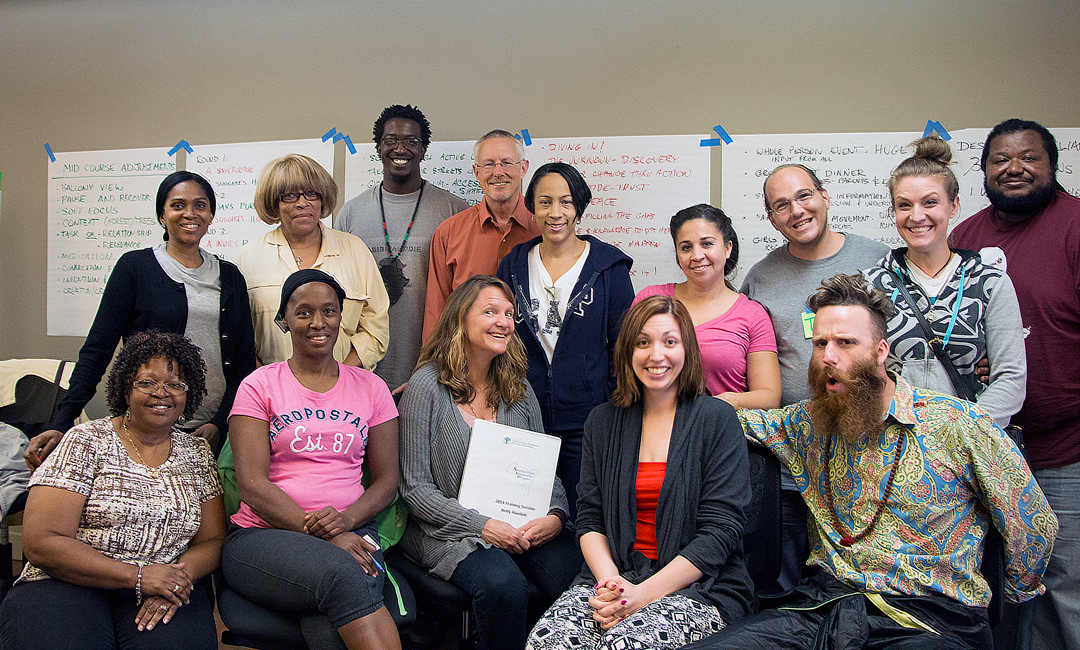Neighborhood Leadership: Building Relationships Yields Inspired Projects
Twenty-five years of developing neighborhood leaders has resulted in many community-inspired projects.
 |
| Photo courtesy of Groundworks Initiatives. |
In 1991, The Community Foundation for Greater New Haven began using an asset-based, grassroots approach to building community that was developed by John McKnight, an urban planner from Chicago. Back then, the endeavor was called the Neighborhood Small Grants Program. As a neighborhood grantmaking program, it focused on supporting projects through grant resources, with a little bit of training to help ensure successful project implementation.
Today the work to build and strengthen community continues as the Neighborhood Leadership Program, with a focus on identifying and augmenting leadership skills within area residents. Participants go through an eight-month training program to support them in imagining, developing, testing and realizing projects that make Greater New Haven's neighborhoods thrive.
Neighborhood Leadership Program co-facilitator Kevin Ewing says there is an emphasis on, "building a relational culture, getting folks to start working with each other, [learning] that there are other people trying to do things."
People apply to the training as individuals, not as members of any group. "We have group conversations about their dreams, what they want the city to look like," says Ewing. "Some people come in with very specific ideas in mind; others just want to do something good."
The facilitators – Ewing and David Carter – follow the Design Thinking model, which is commonly used in software development. Participants come up with ideas; develop a prototype; test it; get feedback; find the gaps and repeat. "It never ends as long as you want to keep building community," Ewing says. The process "requires having conversations with people you're planning to support. If your project is to work with inner city kids, go off and have conversations with some inner city kids and see what they want and find other people who are impacted by the issue. People come in with an idea of what they want to do, and often by the end of the program they've changed it. "
The application process is not too daunting. "It's just to tell us about yourself," Ewing says. "Our goal is to develop neighborhood initiators."
Jo Ann Wilcox of Westville is one of them. She was a member of the Class of 2014. "I've kind of been over the top interested in a particular facet of the way community works," she says. "My thing has been bringing restorative practices to New Haven, hopefully working on the pre-emptive side, doing things to develop community so we don't go down that path [of punishment] in the first place. We have a lot of violence, racial tension, schools that become white flight schools. My work has been pushing the district to rethink its policies around zero tolerance, and the suspensions and expulsions which are the effect of zero tolerance. That [policy] can derail a kid's education. When you look at the statistics of how that plays out, it's a mess, and nobody has a tool box to deal with it when things go awry." She wants to breach the school to prison pipeline. Her main focus is running parent workshops around restorative practices.
Wilcox sums up her experience: "The most effective thing for me in training was learning how to listen and giving myself some tools for listening and the one on one conversations we had [in the Program] helped me figure out where my path was. David and Kevin did a great job and my small group was fantastic. I'm glad I did it."
Olivia Davis, who lives in the Hill, is another Class of 2014 alum. "We learned how to think about the needs of the people, the individuals, and to develop programs. The Program taught us to look where we can fill in the gaps."Oliva's project is called WIRE (Women in Recovery Education). "It's all about women who have gone through some kind of crisis in their lives and the stigma that goes with it. I wanted to provide services for women in shelters but in the process I learned that the staff of those programs also needed training." Davis created a curriculum and partnered with another organization called NeighborWorks/New Horizons to help realize her project.
Recently the Program has been expanded to take in applications from community leaders in New Haven's contiguous towns. For more information about the Neighborhood Leadership Program, please contact Lee Cruz at lcruz@cfgnh.org or call 203-777-7074.
